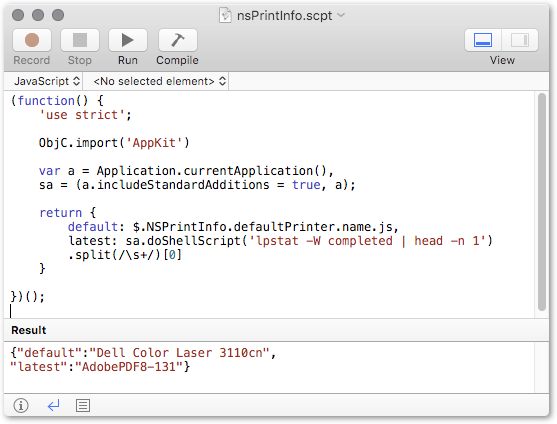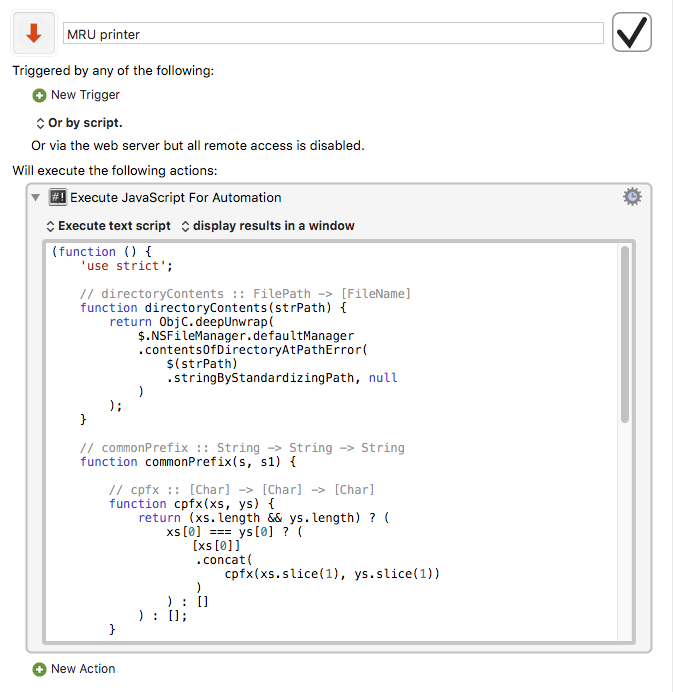Hi,
I have an Applescript that I execute in KM, is it possible to set strPrinterName to the last used printer? if so, which wording will I need to use?
set strPrinterName to “HP Officejet Pro X551dw Printer”
tell application strPrinterName
Thank you
To get the default and most recent printers in JavaScript for Automation, I might write something like this:
(function() {
'use strict';
ObjC.import('AppKit')
var a = Application.currentApplication(),
sa = (a.includeStandardAdditions = true, a);
return {
default: $.NSPrintInfo.defaultPrinter.name.js,
latest: sa.doShellScript('lpstat -W completed | head -n 1')
.split(/\s+/)[0]
};
})();
In AppleScript (others will have a clearer idea) I think you may be able to write something like this for the latter:
set {dlm, my text item delimiters} to {my text item delimiters, " "}
set strPrinter to text item 1 of (do shell script "lpstat -W completed | head -n 1")
set my text item delimiters to dlm
strPrinter
1 Like
Thanks for this it works, but how do i get the name of the printer as it is shown on the Mac?
Much appreciated.
Different repositories of name strings – I’m not aware of a simple way of mapping them.
The best you can do may be to replace the underscores with spaces and drop the final number.
Hey Ali,
Give this a try from an Execute a Shell Script action.
It grabs the last used printer with lpstat and then tries to match it in the printers directory.
cd ~/Library/Printers/;
lastUsedPrinter=$(lpstat -W completed \
| head -n 1 \
| sed -E '
s!_[0-9]+-[0-9]+ .+!!
s!_!*!g
')'*';
echo $lastUsedPrinter;
It works on my system, but the only printer I have installed is a Brother HL-2170W series.
-Chris
1 Like
On the system here that's giving:
AdobePDF8-133 houthakker 18432 Tue Jun 7 10:28:42 2016*
Not sure if that is what @demirtas1 is after.
One other approach, which yields
Adobe PDF 8.0
Might be something like this:
MRU printer.kmmacros (19.7 KB)
JavaScript source:
(function () {
'use strict';
// directoryContents :: FilePath -> [FileName]
function directoryContents(strPath) {
return ObjC.deepUnwrap(
$.NSFileManager.defaultManager
.contentsOfDirectoryAtPathError(
$(strPath)
.stringByStandardizingPath, null
)
);
}
// commonPrefix :: String -> String -> String
function commonPrefix(s, s1) {
// cpfx :: [Char] -> [Char] -> [Char]
function cpfx(xs, ys) {
return (xs.length && ys.length) ? (
xs[0] === ys[0] ? (
[xs[0]]
.concat(
cpfx(xs.slice(1), ys.slice(1))
)
) : []
) : [];
}
return cpfx(s.split(''), s1.split(''))
.join('');
}
var a = Application.currentApplication(),
strLatest = (a.includeStandardAdditions = true, a)
.doShellScript('lpstat -W completed | head -n 1')
.split(' ')[0]
.replace(/_/g, ' '),
lstPrinters = directoryContents('~/Library/Printers')
.map(function (x) {
return x.slice(0, -4); // '.app' dropped
});
return lstPrinters[
lstPrinters
.reduce(function (a, x, i) {
var lngMatch = commonPrefix(strLatest, x.replace(/\s+/g, ''))
.length;
return (lngMatch > a.length ? { // longer than previous matches ?
index: i,
length: lngMatch
} : a);
}, {
index: 0,
length: 0
})
.index
]; // harvesting just the index from the .reduce() accumulator
})();
Hey @ComplexPoint
That works nicely here for my Brother printer.
See if this works for you on your system.
cd ~/Library/Printers/;
lastUsedPrinter=$(lpstat -W completed \
| head -n 1 \
| sed -E '
s! *'"$USER"'.+!!
s!_! !g
s![[:punct:][:digit:]-]+$!!g
s!([a-z])([A-Z]{2,})!\1 \2!g
s!([A-Z]{2,}([a-z]))!\1 \2!g
s! !*!g
s!$!*!
')
echo $lastUsedPrinter;
-Chris
[ Edited 2016/06/08 04:09 CST – minor fix. ]
ccstone:
cd ~/Library/Printers/;!g !
Well, here that is returning:
Adobe*PDF8-133***********
Where the JSA script above returns:
Adobe PDF 8.0
PS we might have to ask the original poster to unpack a little more of the requirements expressed in:
how do i get the name of the printer as it is shown on the Mac
but it doesn't look to me as if there is necessarily a regex-definable relationship between the lpstat naming conventions and those used for the app files in ~/Library/Printers
perhaps deriving an index into a list of the latter from a search for longest shared prefix is about all that can be done ?
Hm... That's weird. I'm basing the new script on my own printer and the string you provided earlier:
AdobePDF8-133 houthakker 18432 Tue Jun 7 10:28:42 2016*
When I plug your lpstat string into my script here it works (of course I have to change the user-name).
Evidently there's something different at your end.
What's the bare result of lpstat -W completed | head -n 1 on your system?
-Chris
Whitespace composition ? Or the forum display subtly obscuring part of your regex from view or copy/paste ?
The raw lpstat output here is:
AdobePDF8-133 houthakker 18432 Tue 7 Jun 10:28:42 2016
(The string I posted above, with trailing *, was of course, the output rather than the input – perhaps also a source of mismatch ?)
ComplexPoint:
(The string I posted above, with trailing *, was of course, the output rather than the input – perhaps also a source of mismatch ?)
Yep. Try the edited version in post #7 .
I had to allow for more whitespace before the user name.
-Chris
ccstone:
cd ~/Library/Printers/;'"$USER"'.+!! !g
Good ! Now yields:
Adobe PDF 8.0.app
Perhaps worth dropping the .app affix ?
Since it's pulling the driver app name directly from the ~/Library/Printers/ folder I'm leaving it be for now.
On the other hand it's a trifling exercise to remove the .app string from the whole.
One can use a Keyboard Maestro Search and Replace Variable action or replace that last line of the shell script with:
# To remove “.app” from the end of the printer name.
Replace:
echo $lastUsedPrinter;
With:
sed 's!\.app$!!' <<< $(echo $lastUsedPrinter);
-Chris

